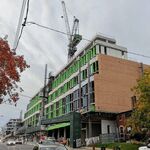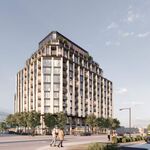Hume: OMB puts Liberals in hot seat
By Christopher Hume
Urban Issues, Architecture
The irony won’t be lost on anyone in this province: Word from Queen’s Park is that the New Democrat Rosario Marchese will introduce a private member’s bill Thursday that would overrule the recent OMB decision to allow a highrise condo which critics complain would spoil the view of the Legislature.
The OMB — the Ontario Municipal Board — is a quasi-judicial provincial body that has final say over all planning matters in the province.
It can overturn decisions made by elected city officials, and does so routinely. In this case, however, the board upheld Toronto City Council’s approval of a condo complex proposed for the northwest corner of Bloor St. and Avenue Rd.
Although Minister of Culture Michael Chan refused to intervene, the Speaker of the House launched the OMB appeal that was ultimately unsuccessful.
But the legislature does have the power to trump the OMB, which is what the New Democrats hope will happen.
Of course, this is not an option for most Ontarians, who have had to live with board rulings they consider unfair and insensitive to local concerns.
Though the OMB often decides against developers, it has a reputation of being pro-development. Certainly, it presides over a winner-take-all process that tends to favor wealthy builders who can afford no end of expert witnesses to testify on their behalf.
Local neighbourhood groups feel they are at a disadvantage, unless their pockets are deep enough to fight all the way.
The bill and a motion the NDP introduced Wednesday would put the Liberals in a tricky situation. Though few would disagree with the contents, it raises important questions about the very existence of the OMB. No other province in Canada has such a body, and many cities do a much better job of planning than those in Ontario, especially Toronto.
Dating from the 19th century, the OMB was created to oversee municipalities that weren’t considered up to the task of self-governance.
As a result, the board has had a stultifying effect on planning. As the example of Toronto makes clear, planning is left to local councillors who routinely make their decisions for crass political reasons. At the same time, the Toronto planning department, demoralized and short 65 staff members, reports to a deputy city manager. Its advice is frequently ignored by city councillors more interested in catering to ward concerns than making the hard choices.
For more than a century, the OMB has let them off the hook.
Though Toronto’s Official Plan encourages high-density development on main streets, it has little to say about preserving heritage buildings or view corridors. The Province’s argument that the proposed condos would ruin the vistas looking north from points south of the Legislature comes a bit late in the day, but better late than never.
And let’s not forget that the province does not have to stop the condos from going ahead to get its way, only to limit their height.
On the other hand, if the Legislature does overrule the OMB, it would appear to confirm what Ontarians have been saying all along; namely that the board should have no business in local planning decisions in the province.
If Queen’s Park can tell the OMB to get lost, why can’t the rest of us?
Clearly, the time has come for a mature debate about city planning. No doubt that would be extremely difficult — and why it hasn’t become an election issue in Toronto’s current mayoral race remains a mystery.
But one thing is certain, as long as the OMB continues to exist, that discussion will never happen.
Christopher Hume can be reached at
chume@thestar.ca
Chris is such a stud, love his writing.





